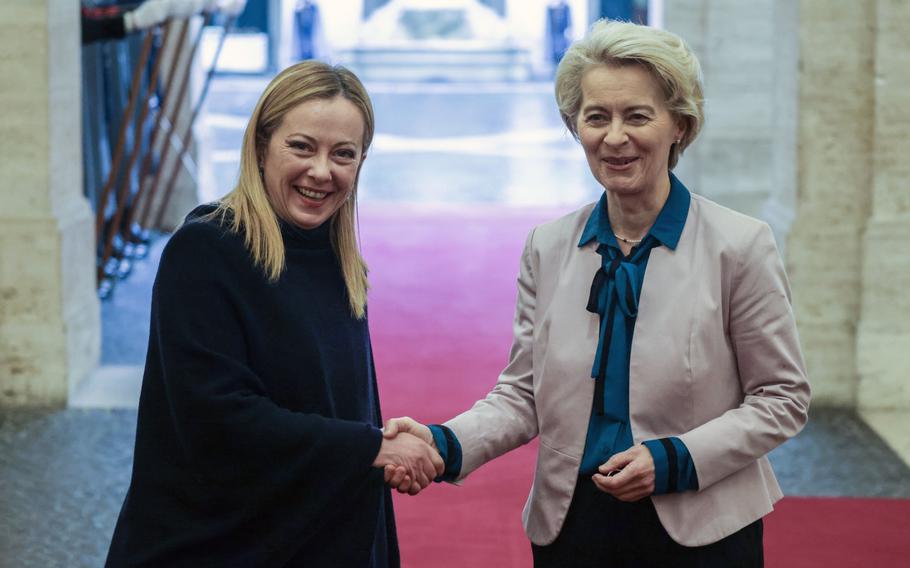Opinion
The future of European leadership is female
Special to Stars and Stripes May 9, 2024

Italy Prime Minister Giorgia Meloni and European Commission President Ursula von der Leyen in Rome on Jan. 9, 2024. (Alessia Pierdomenico/Bloomberg)
While the world’s attention is captured by the upcoming U.S. presidential elections, dominated by two strongman leaders in their 70s and 80s, the future of European leadership is female.
In this crucial year of election, it is not only the American people but also the citizens of the European Union who will be going to the polls. At the helm of the European Commission, Ursula von der Leyen is bidding for a second term. While during the past five years she has occasionally been at odds with the EU capitals, von der Leyen is often called one of the most powerful leaders in Europe, who steered the Continent through the crisis of pandemic and the first major war on European soil in decades.
Having a competent female leader as the head of Europe encourages individual European countries not to shy away from female presidents and prime ministers. Unlike the tyrannical regimes of Russia and Iran, many young European democracies have flourished under female heads of state. Inclusion and female empowerment is what distinguishes the West from the rest and ensures a brighter future.
The young democracies in the Baltics — Latvia, Lithuania and Estonia — stand out in Europe, notably by the increasing dominance of female leaders in their politics. All three Baltic states have female prime ministers. Estonian Prime Minister Kaja Kallas has made headlines as the staunchest Ukraine supporter, favored by many countries to become the next head of NATO. The former president of Lithuania Dalia Grybauskaite was often compared to Germany’s Angela Merkel due to her reputation as an ‘’iron lady’’ and a fierce Vladimir Putin critic. She gained respect from the world leaders and put the small Baltic nation on the geopolitical map. Currently Lithuania is also run by a women-led coalition, with Prime Minister Ingrida Simonyte running for president in the upcoming election this month.
Unsurprisingly, Vilnius also hosts Sviatlana Tsikhanouskaya — the Belarusian opposition leader, feared by President Alexander Lukashenko himself. The phenomenon of Tsikhanouskaya represents a glaring contrast between a Soviet-style strongman autocrat and a progressive female leader — the latter option becoming a trend in Europe.
In fact, in the year of election many European countries will choose between male and female candidates. Alongside Lithuania, Iceland is set to see inclusion of female contenders in its presidential election. The successes of the young EU states have also led to the countries aspiring to join the Union empowering female leaders.
The most recent case presents itself in North Macedonia, where the incumbent President Stevo Pendarovski lost to Gordana Siljanovska Davkova by a landslide. Siljanovska Davkova, who has pledged to run the country based on inclusion and unity, romped to victory with almost 65% of the votes, while Pendarovski claimed less than half as many votes, at 29%. Support for Siljanovska Davkova comes at the time when North Macedonia has been suffering from high-level corruption, poverty and high unemployment rates for years. In her campaign, she encouraged female involvement in politics, and investment in the youth. Years of stagnation in North Macedonia have pushed the young generation away in a search of better opportunities and a hope for a change. Hence, the president-elect furthered that it is ‘’enough with the words that the future belongs to the youth, they must also take the present in their hands.’’
And the present — marked by wars, conflicts and instability in the world — requires a balanced political approach. One that is not solely run by strongmanship, which we often see expressed by male leaders cut from the same cloth. What European countries need is a delicate dance between a stout approach toward our adversaries, and a compassionate hand toward uninvolved civilians who often become collateral damage. With Europe recognizing the need for a balanced political approach, this trend should become a universal one, transcending European borders.
Despite being mature democracies, leading countries such as the U.S. are yet to see a female president. In the most important election of their generation, the American citizens are faced with a choice between two versions of the past, rather than the future. Additionally, countries confronted with challenges, such as Israel — that has previously seen success with a female voice — could also benefit from a Golda Meir of the new generation. Finally, if small rather young European democracies could achieve such progress, there is no excuse for the political giants not to do the same.
Monika Bickauskaite-Aleliune, a former global policy engagement officer at the Legatum Institute and former researcher at the German Marshall Fund, is currently public policy director at Key Elements Group.